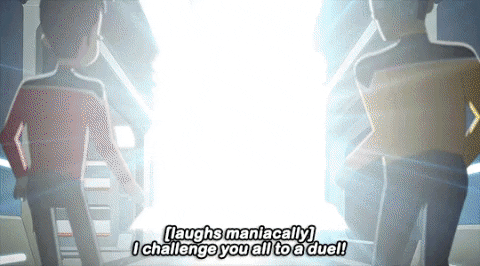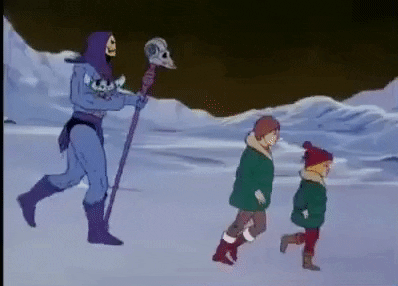Dr. Dysart! There's a terrible scene with the Strang boy in the Violence Room.
His Mother brought him chocolates.
He threw them at her, hard!
Manchester Black’s Mother :
Don't you dare! Don't you dare.
Don't you look at me like that.
I'm Not A Doctor who'll take anything.
Don't you give me that stare, Young Man.
Mrs. Strang.
I know your stares, they don't work on me...
Leave here at once!
What did you say?
I tell you to leave here at once.
Goodbye, Alan.
Wait for me.
I must ask you never to come here again.
You think I want to? Do you think I want to?
What on earth has got into you?
Into ME?
Can't you see the boy's highly distressed?
He's at the most delicate stage of treatment.
He's totally exposed, ashamed, everything you can imagine.
And me? What about me? What do you think I am?
I'm a parent. Of course, that doesn't count.
Isn't it a dirty word in here, "parent"?
You know that's not true.
I know it, alright. I've heard it all my life -- It's our fault.
Whatever happens, WE did it.
You say to us,
"Who forbids Television?"
"Who does what behind whose back?" As if we're criminals.
Let me tell you something. We're NOT criminals.
We've done nothing wrong. We loved Alan.
We gave him the best love we COULD.
Poor Frank digs into the boy too much,
but nothing in excess. He's not a bully.
No, Doctor.
Whatever has happened...
has happened because of Alan.
If you added up everything we did to him,
from his first day on earth to this...
you wouldn't find out why
he did this terrible thing.
Do you understand what I'm saying?
I want you to understand...
because I lie awake, thinking it out.
And I want you to know
I deny it absolutely,
what he's doing now.
Staring at me, attacking me
for what he's done...
for what he is.
Mrs. Strang!
You have your words,
and I have mine.
But if you knew God, Doctor,
you would know about The Devil.
The Devil isn't made by
What Mummy Says,
or What Daddy Says.
The Devil is there.
It's an old-fashioned word,
but a True thing.
I'll go.
What I did just now was inexcusable.
I only know that...
He was My Little Alan...
and then The Devil came.
*****
I thought you liked your mother.
She doesn't know anything.
I haven't told her what you told me.
It was lies, anyway.
What was?
You and your pencil.
Just a con-trick, that's all.
Made me say a lot of lies.
Like what?
All of it. Everything I said.
A lot of lies.
I see.
Ought to be locked up.
Bloody Tricks.
Thought you liked tricks.
There'll be the drug next.
What drug?
I've heard. I'm not ignorant.
I know what you get up to in here...
shove needles in people and pump them full of truth drugs...
so they can't help Saying Things.
That's next, isn't it?
Do you know why you're here?
So you can give me Truth Drugs?
He actually believes they exist.
Hesther :
Truth Drugs?
Yes.
Hesther :
And don't they?
Of course not.
The important thing is that
he wants A Way to Speak...
Finally tell me what happened in those stables.
Tape is too isolated... and hypnosis, he pretends, is A Trick, so he can deny it later.
I'm tempted to
Play A Real Trick on him.
Hesther :
Like what?
Give him an aspirin.
Tell him it's the strongest truth drug in the world.
Hesther :
He'd just deny everything again afterwards.
The same thing all over.
Superman :
No, because I'd tell him The Truth afterwards...
that it was simply an aspirin.
He'll Believe Me.
Underneath all that glowering,
The Boy Trusts Me.
You realize that? I'm sure he does.
Poor, bloody fool.
Hesther :
Please, Martin, dear,
don't start that again.
Superman :
Can you do anything worse to somebody than to…
Take away Their Worship?
Hesther :
Worship?
Superman :
Yes, that word again.
Hesther :
Isn't that a little extreme?
Superman :
Extremity — is The Point.
Hesther :
Worship isn't destructive, Martin —
I know that.
Superman :
I don't —I only know
it's the core of his life.
What else has he got?
Think about it.
He can hardly read.
He knows no physics or engineering
to make The World real to him...
No paintings to show him
how others have enjoyed it...
No music except television jingles...
No history except tales from a desperate mother...
No friends to give him a joke
or make him know himself
more moderately.
He's a modern citizen for whom Society doesn't exist.
He lives one hour every three weeks, howling in a mist.
"With My BODY, I Thee Worship."
Many men are less vital with their wives.
Hesther :
All the same, they don't BLIND their wives, do they?
Superman :
Come on.
Hesther :
Well, do they?
Superman :
You mean he's a violent, dangerous madman, who'll go round the country doing it again and again?
Hesther :
I mean he's In PAIN, Martin.
He's been In Pain for most of His Life.
Superman :
Yes.
Hesther :
And you can take it away.
Superman :
Yes.
Hesther :
Then that's all you need to know, in the end.
Superman :
No.
Hesther :
Why not?
Superman :
Because — it is HIS.
Hesther :
His?
Superman :
HIS Pain. His Own. He made it.
Hesther :
I don't understand. I don't!
There's no merit about being In Pain, that's just pure old masochism.
Superman :
I'm talking about Passion, Hesther.
You know what that word meant originally? Suffering.
The way you get Your Own Spirit through Your Own Suffering.
Self-chosen. Self-made.
This boy's DONE that.
He's created his own desperate ceremony...
just to ignite one flame of original ecstasy
in the spiritless waste around him.
Alright... he's destroyed for it, horribly.
He's virtually been destroyed BY it.
One thing I know for sure, that boy has known a PASSION... more ferocious than I have known in any second of my life.
Let me tell you something :
I envy it.
Hesther :
You CAN'T.
Superman :
Don't you see?
That's what his stare has said all this time :
"At least I galloped.
When did you?"
I'm jealous, Hesther.
Jealous... of Manchester Black.
Hesther :
That's absurd.
Superman :
Is it?
Hesther :
Yes, utterly. Utterly!
Superman :
I go on about my wife —
Have you thought about the husband?
The finicky, critical husband, with his art books on mythical Greece?
What REAL Worship has he known?
Without worship, you shrink!
It's brutal.
I shrank my life.
No one can do it for you.
I settled for being pallid and provincial
out of my eternal timidity.
The old story of
bluster, and do bugger-all.
I didn't even dare to have children...
didn't dare to bring children into a house and marriage as cold as mine.
I tell everyone Margaret
is The Puritan, I'm The Pagan.
Some Pagan.
Such wild returns I make
to the womb of civilisation.
Three weeks a year
in the Mediterranean.
Beds booked in advance, meals paid with vouchers...
cautious jaunts in hired cars, suitcase crammed with Kaopectate.
What a FANTASTIC Surrender
to The Primitive.
The "Primitive."
I use that word endlessly.
"The Primitive World," I say,
"What Instinctual Truths were lost with it."
While I sit baiting that poor,
unimaginative woman with the word...
That freaky boy is trying
to conjure The Reality.
I look at pages of centaurs
trampling the soil of Argos.
Outside My Window, that boy
is trying to BECOME one
in a Hampshire field.
Every night I watch that woman knitting,
a woman I haven't kissed in six years.
And he stands for an hour in The Dark,
sucking the sweat off his god's hairy cheek.
In the morning,
I put away my books
on the cultural shelf...
Close up my Kodachrome snaps
of Mount Olympus...
Touch my reproduction statue
of Dionysus for luck...
and go off to The Hospital
to treat HIM for Insanity.
Now do you see?
Hesther :
The Boy's In Pain, Martin.
That's all I see.
I understand, you know.
I'm not just being Mrs. MacBrisk.
You haven't made
that kind of pain.
So few of us have.
But you've still made
OTHER things.
Your own thoughts. Your own skill.
Skill absolutely unique to you.
I've watched you do it, year after year...
and it's marvelous!
You can't just sit and say
"It's all provincial,
You're just a butcher."
All that stuff is stupid, hateful.
Alright, you never galloped.
Too bad.
If I have to choose between his galloping
and your sheer training...
I'll take The Training every time.
What's more,
so will the boy, at this moment.
That stare of his isn't accusing you,
it's simply demanding.
Superman :
What?
Hesther :
Just that.
YOUR Power to pull him out of
The NIGHTMARE he's galloped himself INTO.
Do you see?
Do you see?

